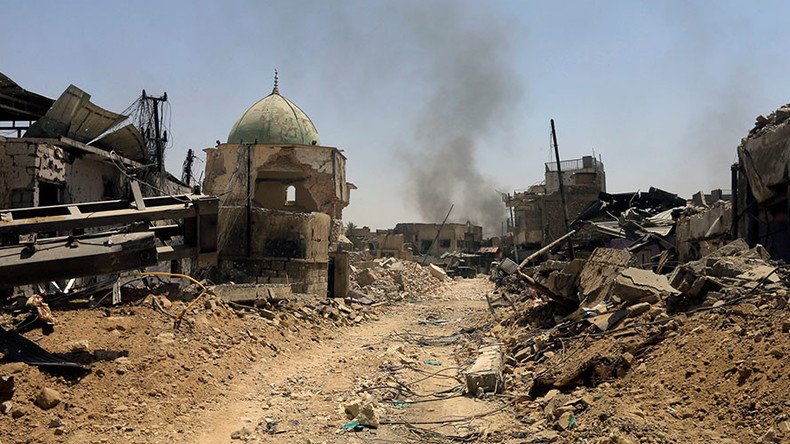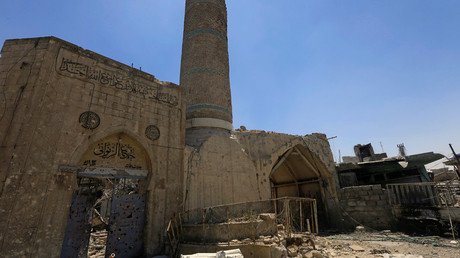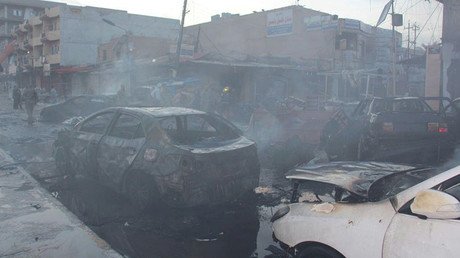Life after liberation: West Point report shows ISIS danger remains in Syria, Iraq

Islamic State militants continue to haunt cities in Iraq and Syria officially liberated from their control, while the devastation caused by the fighting poses challenges for restoring basic services, says a new study from the US Military Academy.
Authors Daniel Milton and Muhammad al-Ubaydi from the Combating Terrorism Center at West Point looked at 11 cities in Iraq and five in Syria and tallied up the attacks by Islamic State (IS, formerly ISIS/ISIL) militants between the day of their liberation and April 2017.
Their analysis reveals a “nuanced security environment” in the liberated cities. Relying solely on IS reports, the authors counted 1,468 separate attacks, resulting in “just under 2,600 deaths, about 8.6 per attack.”
“Cities in Iraq appear to experience more post-liberation violence than do cities in Syria,” the authors concluded. The highest number of attacks per month on average, 130, was recorded on the left bank of Mosul, declared liberated in January 2017. Baiji, a city halfway between Mosul and Baghdad liberated in November 2014, was in second place with 21.
While suicide attacks attract a lot of attention, they account for a very small number of IS operations, the authors noted. More than half the attacks, or 56 percent, are from a distance ‒ with rockets, mortars or sniper fire. Suicide bombings amount to only 5 percent of operations, with suicide fighters at a mere 2 percent.
The largest number of suicide operations took place in Baiji, followed by the Syrian cities of Shadadi and Manbij, wrote Milton and al-Ubaydi. Most suicide attacks happen shortly after a city’s liberation, then become less frequent in favor of attacks from a distance.
“It is hard to independently verify whether or not what the Islamic State is reporting is an accurate representation of what is actually occurring on the ground,” the authors note, however.
Another problem facing the population liberated from IS is the widespread destruction of their cities and towns.
“Many of the areas discussed in this report remain decimated [sic] due to the combination of Islamic State’s governing tenure and its parting blows, but also due to some of the tactics employed by forces retaking the cities,” Milton and al-Ubaydi wrote.
In Ramadi, liberated in February 2016, a UN survey of the damage found 5,700 damaged buildings, 35 percent of which were completely destroyed. Even the buildings that remained standing were not safe, as mines and improvised explosive devices have continued to claim lives.
Fallujah was liberated in June 2016, yet as of March 2017 the Iraqi city’s mayor was still residing in the Kurdish-dominated city of Erbil, only traveling to Fallujah on certain days for work. Its citizens are “still facing an array of challenges, from destroyed buildings to live Islamic State munitions buried in the rubble to the continuing threat of [IS] attacks,” Milton and al-Ubaydi wrote.
In addition to security and reconstruction challenges, there is the matter of conflict between various regional actors fighting against IS, such as Turkey, the Russian-backed Syrian government, the US-backed government in Iraq, and the Kurds in both Iraq and Syria.
“Simply pushing the Islamic State out of a formal governing position in Iraq and Syria, while an important first step, will not ensure the achievement of these post-liberation tasks and reduce the likelihood that the Islamic State or some other terrorist organization emerges to take advantage of a tenuous peace,” Milton and al-Ubaydi concluded.














